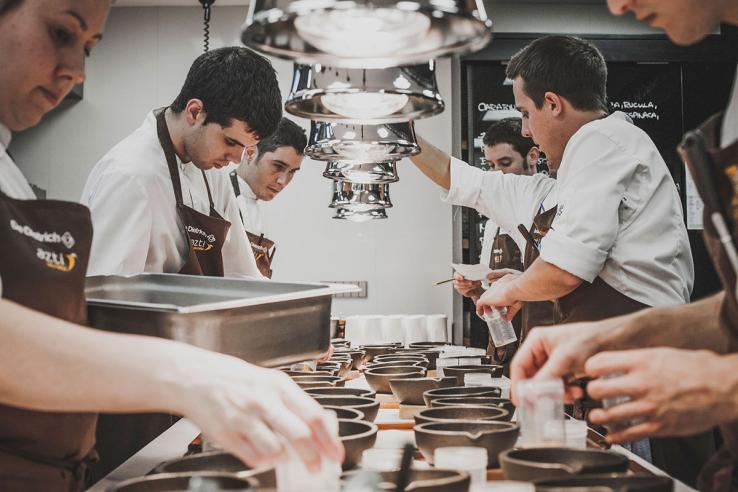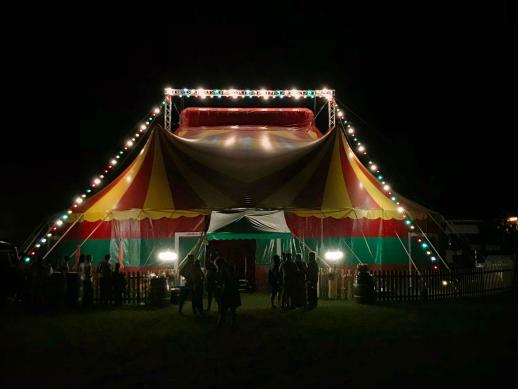For Basques, food is a religion, a blind faith, a celebration, a matter of utmost importance.
10 keys to understanding Basque gastronomy
13 Apr 2020
1. Food first
Don’t mess with food, especially in a country where much of the social life revolves around eating. It’s a standard topic of conversation and most plans involve food. For Basques, food is a religion, a blind faith, a celebration, a matter of utmost importance. First things first: what to eat and where to eat it. They’ll be time to sort out the rest of the world once we’re sitting around the table.
2. A shared treasure
Vitoria-Gasteiz is in the top ranking of European cities with the most green space; Bilbao flaunts its Guggenheim Museum and amazing urban revitalisation; Donostia is the city of festivals and a destination that has drawn visitors from 19th-century royalty to surfers the world over. But what all three cities have in common, what unites the our three Basque capitals and the region as a whole, is food.
3. The commandments
The philosophy of Basque cuisine is based on a series of strict commandments: locally-sourced and/or zero-kilometre ingredients, seasonal produce, a personal touch, and a natural blend of tradition and avant-garde. Tradition is as important as sophistication and innovation, and they are not at odds with each other. Two examples of mind-bending creativity intertwined with long-standing tradition: Juan Mari Arzak’s popular redfish terrine and Pedro Subijana’s green pepper sea bass served at his restaurant Akelarre.
4. Curious cooking clubs
Equipped with commercial kitchens and dining rooms, cuadrillas (groups of friends) meet regularly in these locales for lunch or dinner. They’re not restaurants open to the public and there are no waiters or cooking staff. The tasks are generally shared among the members – some do the shopping, others do the cooking. And once everyone has finished their meal, the total cost is tallied up and split equally. Visitors and tourists might not even notice them but there are hundreds of cooking clubs, or txokos, in the Basque Country.
For Basques, food is a religion, a blind faith, a celebration, a matter of utmost importance.
5. Txotx!
The cider season kicks off on the Friday before January 20th and lasts until the end of April or early May. At some cider houses people eat standing up, while at others, they’re seated. But all cider houses follow the same rituals: set menu of cod omelette, fried cod and thick steak, cheese with quince and walnuts for dessert, and all washed down with unlimited cider served from the barrel at the sound of “Txotx!”. Most important of all is the fun and relaxing atmosphere.
6. On Michelin stars and other constellations
An impressive statistic: San Sebastian is second only to Kyoto in the number of Michelin stars per square metre on the planet. It’s easy to spot the glowing constellations of award-winning restaurants on a map of this part of the world. A total of 23 restaurants in the Basque Country were awarded Michelin stars in 2019, four of which earned the coveted 3-star rating.
7. Basque chefs: local heroes (universal ambassadors)
At the end of 1976, a dozen Basque chefs founded a movement known as New Basque Cuisine. Paul Bocuse was their messiah, father of the nouvelle cuisine movement in France. Its pillars were three: cooperation, innovation and the human factor. It revolutionised Basque gastronomy and shook the culinary world. Forty years later, Arzak, Subijana and company are keeping the spirit very much alive. In recent years several Basque chefs have picked up the baton from the master veteran chefs. Among the new crop are Aizpea Oihaneder, Elena Arzak, Pilar Idoate, Eneko Atxa, Gorka Txapartegui, and Ruben Trincado.

8. Pintxomania
You’ve probably heard by now that pintxos are small bits of food that you find at bars. Ranging from the traditional piece of bread with some kind of topping, to the fancier haute cuisine in miniature, pintxos can usually be eaten in two or three bites. In 2018 the Lonely Planet’s ‘Ultimate Eatlist’ billed pintxo-hopping as ‘the top food experience in the world’. It has become wildly popular among visitors and is a deeply-rooted tradition among the Basques. Oh, and pintxos are generally eaten while standing. Long live informality!
9. The word of a Basque
Trust between customer and server is sacred. It’s not customary at a bar to settle up right after your drinks are served. There’s no stress involved when people eat and drink in the Basque Country. Only when you’re finished will the server pop the question (What did you have?), to which the customer will always answer in all honestly. ‘Palabra de vasco’, (the word of a Basque) is good as gold, no signatures or handshakes needed. The architect Frank Gehry once said: ‘When the Basques say something, you don’t have to get it in writing.’
10. Basque Culinary Center: the mecca of flavour (and expertise)
It’s not surprising that the Basque Country is home to a faculty of gastronomy. The Basque Culinary Center celebrated its first graduating class in 2015. Since then, students from around the world have been learning about avant-garde cuisine and broadening their horizons with other gastronomy-related knowledge and skills. Attached to the University of Mondragon, the best chefs on the planet lead master classes at the ‘Harvard of cuisine’. The BCC is also home to BCC Innovation, the first technology centre for gastronomy.





